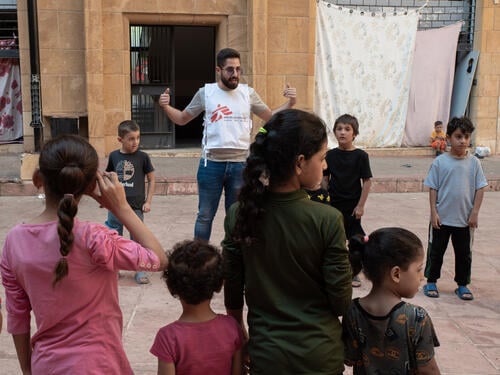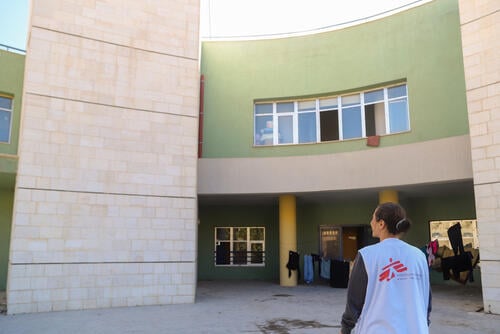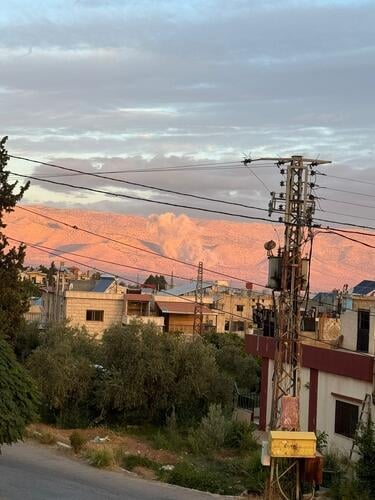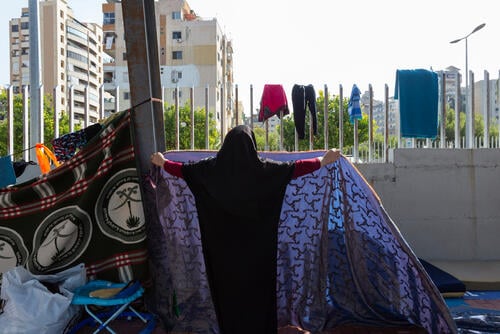“My daughter is only 14, but with all the difficulties we've faced, she's reacting like an adult to the bombings,” says Ezdihar, a displaced mother in Lebanon. “She's had to grow up quickly.”
On the night of 28 September, Ezdihar and her family were having dinner at home in the southern suburbs of Beirut when they received an alert about an imminent strike by Israeli forces. While her husband went to care for his mother, Ezdihar took her children and, with neighbours, sought refuge in central Beirut.
After spending a night on the streets, they moved into the Azarieh shelter, a repurposed commercial building now housing around 3,500 displaced people. Today, they are among 1.2 million people displaced by the war between Hezbollah and Israel, according to Lebanese authorities.
Médecins Sans Frontières (MSF) is attending to the medical and mental health needs of people living in collective shelters like Azarieh, including children like Ezdihar’s daughter. She is one of a generation navigating a landscape of fear and uncertainty, in which children are hit the hardest.
The mental health impacts of war and displacement
In less than a month since the escalation of war, more than 2,300 people have been killed in Lebanon, with the majority of deaths occurring in the last 3 weeks. More than 11,100 have been injured, according to health authorities.
The violence and destruction people are witnessing can have lasting impacts on psychological and emotional well-being, especially for children. Like Ezdihar’s daughter, countless children across Lebanon have had to grow up quickly under the harsh realities of war, including being uprooted from their homes, having their schooling disrupted, being separated from their friends, and losing access to basic necessities like food and shelter.
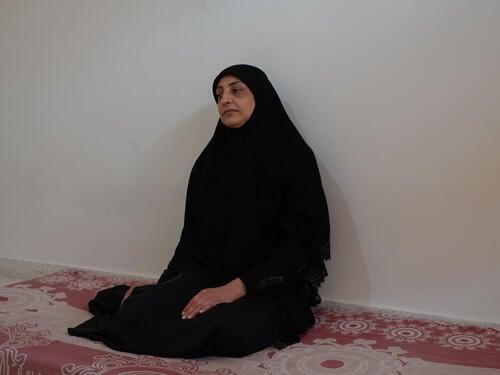
“Many parents are observing behavioural issues in their children—anger, aggression, and other troubling behaviors—which heightens concern for their well-being,” said Amani Al Mashaqba, MSF's mental health activity manager in the Bekaa governorate.
Children are not the only ones in need of mental health support, however. Many of MSF’s patients report feeling overwhelmed and traumatised by the constant threat of violence, expressing deep concerns about their future in an unstable environment.
Grief over lost family members and the pain of separation due to displacement further compound their distress. Others worry about managing chronic health conditions or the possibility of missing a year of school. These experiences have had a significant impact on people’s mental health.
“People are expressing a strong need for mental health services, particularly for trauma,” Al Mashaqba added. “It’s affecting their daily lives, from sleep disturbances to appetite loss.”
MSF teams are responding by providing general and mental healthcare to displaced people, including psychological first aid and psychoeducation through our mobile medical units across the country. However, getting people to acknowledge their struggles and express vulnerability isn’t always easy.
Many feel they should remain resilient in the face of hardship, as our mental health teams have observed. Convincing them that it is okay to experience emotions has been a challenge at times, particularly for young boys who are commonly taught to suppress their feelings.
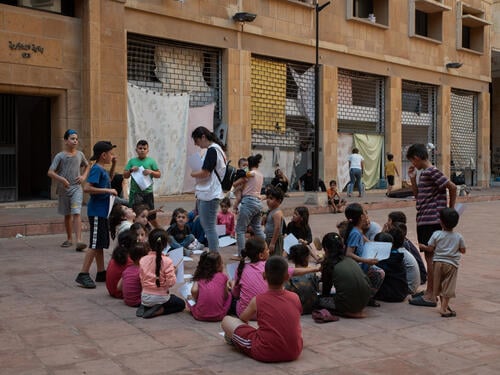
To further extend this support, MSF has also launched a helpline through which people can receive remote assistance from clinical psychologists who help manage trauma-related symptoms such as anxiety and grief.
A helpline for healing
The MSF helpline allows us to reach people who are unable to access our services in person, particularly in the south of Lebanon, where heavy bombardments and mobility restrictions make travel difficult. This accessibility is crucial during such a volatile period, as many individuals are on the move and face barriers to accessing care including the high cost of transportation and cultural stigma surrounding mental health.
Many of the helpline callers are parents facing difficulty trying to help their children cope during the war, often while noticing changes in their children’s behavior.
Parents are struggling to explain the frightening sounds of bombs and gunfire to their kids, at times resorting to misleading explanations in an effort to reassure them. Gunfire, for example, may be described as “happy shooting,” such as shots fired in celebration during weddings. Our helpline psychologists equip parents with strategies to communicate honestly and create safe spaces for their children to express their feelings.
“While we must be realistic about the situation, we also need to normalise their feelings,” explained Al Mashaqba. “It’s important for parents to listen to their children and understand how the sounds affect them. They can encourage kids to share their feelings through drawing or talking.”
Facing increasing demand, the helpline has seen a dramatic rise in calls, from five calls a day in the beginning to as many as 80 in a single afternoon. Overall, the helpline has received nearly 300 mental health calls, the majority coming in the last two weeks alone.
It’s important for parents to listen to their children and understand how the sounds affect them. They can encourage kids to share their feelings through drawing or talking.Amani Al Mashaqba, MSF's mental health activity manager in the Bekaa governorate
In addition, our mobile teams have facilitated psychological first aid group sessions for nearly 5,000 individuals as of 21 October, and more than 450 people have benefitted from individual mental health sessions.
Our teams also provide psychological first aid, which includes active listening and techniques for stress relief, allowing patients to express their feelings and concerns. Along with critical medical and mental healthcare, our teams are also distributing essential items such as mattresses and hygiene kits to displaced people.
A country in crisis
This current war comes on the heels of a prolonged economic crisis that left over 80 per cent of the Lebanese population living below the poverty line and in urgent need of assistance. The healthcare sector has faced severe challenges, with public services deteriorating and private healthcare becoming increasingly unaffordable.
“One of my psychologists shared that when a woman learned our services are free, she began to cry,” Al Mashaqba noted. “People are often unaccustomed to having access to these kinds of resources without the financial burden.”
Moreover, Lebanon is home to a significant number of refugees, including 1.5 million Syrians and over 200,000 Palestinians, many of whom have faced repeated displacements. For these individuals, the fear of deportation and the struggle to find safety can be overwhelming.
“Some have told me they would rather die than experience the trauma of being a refugee again,” Al Mashaqba said.
MSF is conducting ongoing needs assessments for internally displaced people, and as the situation evolves, our teams are working closely with partners and hospital networks to provide comprehensive support wherever possible.



